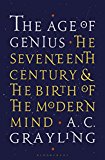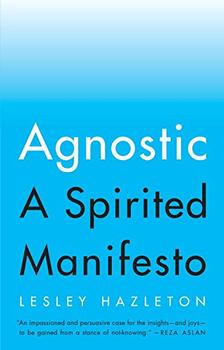Summary | Excerpt | Reviews | Beyond the book | Read-Alikes | Genres & Themes | Author Bio

Whatever your personal beliefs (and I imagine
among the readership of this ezine they are both diverse and
strongly held) I suggest that there is one thing that the
majority of us would be able to agree on, which is that whether
we believe in one God, or many, or in none at all, we agree that
any deity worthy of our belief is not only robust enough to be
able to handle us little people questioning our beliefs as a
process of growing, but would actually welcome this process as
preferable to blind acceptance.
If you agree with this statement, then you should consider
spending a few minutes reading the 6,000 word excerpt from
The God Delusion at BookBrowse, which will give you a very
good flavor of the book - enough to know whether you'll want to
read it in full, and likely enough to hold your own in
conversation about it, especially with the many people who have
firm opinions on the topic but haven't actually read the book!
To quote The Economist, "Mr Dawkins is an atheist, an
evolutionary biologist and an eloquent communicator about
science, three passions that have allowed him to construct a
particularly comprehensive case against religion .... Atheists
will love Mr Dawkins's incisive logic and rapier wit and theists
will find few better tests of the robustness of their faith.
Even agnostics, who claim to have no opinion on God, may be
persuaded that their position is an untenable waffle."
What will make The God Delusion difficult to swallow for
many is that Dawkins's target is not just the occasional deluded
zealot who blows himself up in the name of God but also ordinary
everyday religious moderates who, as Dawkins sees it,
consolidate the position of fundamentalists by promoting faith
as a virtue and enforcing an overly pious respect for religion.
Dawkins cites real life examples of how our respect for religion
has got out of hand, such as the church in New Mexico which has
gained a US Supreme Court ruling that its members can take a
special tea containing an illegal hallucinogenic because they
believe that the drug enhances their understanding, without
having to produce any evidence that it does.
"Imagine members of an art appreciation society pleading in court that they 'believe' they need a hallucinogenic drug in order to enhance their understanding of Impressionist or Surrealist paintings. Yet, when a church claims an equivalent need, it is backed by the highest court in the land. Such is the power of religion as a talisman."
Then there are more worrisome stories such as
the 12-year-old boy in Ohio who won the right in court to wear a
T-shirt to school bearing the words 'Homosexuality is a sin,
Islam is a lie, abortion is murder. Some issues are just black
and white!' The case was not upheld on the basis of freedom of
speech, because freedom of speech is deemed not to include 'hate
speech', so instead his lawyer appealed to the constitutional
right to freedom of religion, and won the case.
Dawkins also touches on the brouhaha over the cartoons depicting
Mohamed that appeared in the Danish newspaper Jyllands-Posten.
His interpretation of events, apparently based on fact but not
fully reported in the news, is quite enlightening.
Some would respond that these incidents, along with the many
religious wars being fought around the globe, are isolated
incidents, and are more than balanced by all the good religion
does. Dawkins's response to this is that every positive aspect
of religion can be replaced by equally positive non-religious
substitutes.
His arguments are not new, but they are compellingly laid out.
What is particularly interesting are his views on why religion
is so widespread. Why have we been worshiping deities in some
shape or form since before the dawn of civilization, and why do
so many people seem even more drawn to religion the further we
move into the modern world? After all, if religion was such a
"bad thing" wouldn't natural selection (which Dawkins is
obviously a proponent of) have weeded it out of our psyche long
ago? Not according to Dawkins who believes that religion is a
by-product of our mental abilities that developed for other
purposes. One aspect of which is that up to a certain age
children are "programmed" to believe their parents, which is a
good thing for keeping them safe but it also enables "worthless"
beliefs to be passed from generation to generation. In Dawkins's
view, giving children religious instruction when they are at an
age where they naturally accept information supplied by their
elders as truth is tantamount to child abuse.
Dawkins's views have been clear since his early books such as
The Selfish Gene, but in The God Delusion, for the
first time, he sets out to overtly change opinions. Some
reviewers feel that his writing is overly vitriolic at times and
as such will put off the very people that he wishes to persuade.
Dawkins, obviously aware that this would be a likely response
addresses this particular point in the opening pages, ending his
Preface with the following:
"I am not in favour of offending or
hurting anyone just for the sake of it. But I am intrigued and
mystified by the disproportionate privileging of religion in our
otherwise secular societies. All politicians must get used to
disrespectful cartoons of their faces, and nobody riots in their
defense. What is so special about religion that we grant it such
uniquely privileged respect? As H. L. Mencken said: 'We must
respect the other fellow's religion, but only in the sense and
to the extent that we respect his theory that his wife is
beautiful and his children smart.'
It is in the light of the unparalleled presumption of respect
for religion that I make my own disclaimer for this book. I
shall not go out of my way to offend, but nor shall I don kid
gloves to handle religion any more gently than I would handle
anything else."
![]() This review was originally published in The BookBrowse Review in January 2007, and has been updated for the
January 2008 edition.
Click here to go to this issue.
This review was originally published in The BookBrowse Review in January 2007, and has been updated for the
January 2008 edition.
Click here to go to this issue.

If you liked The God Delusion, try these:

by A.C. Grayling
Published 2017
Out of a 'fractured and fractious time,' the author asserts persuasively, the medieval mind evolved into the modern. Another thought-provoking winner from Grayling." - Kirkus

by Lesley Hazleton
Published 2017
A widely admired writer on religion celebrates agnosticism as the most vibrant, engaging - and ultimately the most honest - stance toward the mysteries of existence.
Your guide toexceptional books
BookBrowse seeks out and recommends the best in contemporary fiction and nonfiction—books that not only engage and entertain but also deepen our understanding of ourselves and the world around us.